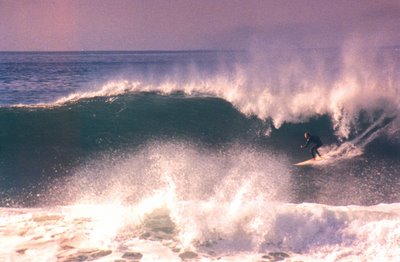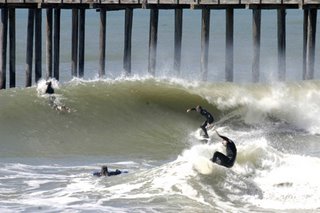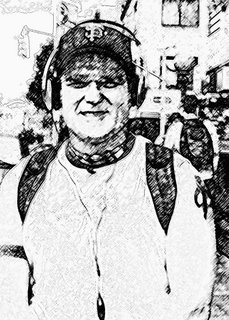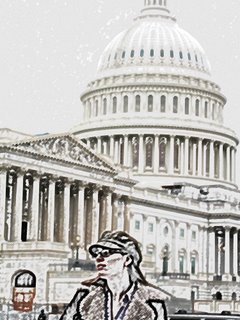Pismo Surf Fight

A chorus of disgusted “ughs” goes up as Butch digs into the guy’s eye socket. That’ll ruin business at the Snack Shack for sure.
I see plenty of familiar faces in this circle. Surfers who go to Eternal Swell bible study, guys who surf in some of the contests, ride for Frampton, come here every morning, work at Diablo; they’re all here watching.
Pismo surf fight
Buthch keeps an eye out for a guy who gets in his way
by Darren Delmore
The grease and cigarette smoke’s in the air and Butch Maybee’s about to crush this valley guy’s skull right here in the Pismo parking lot. Even the wall rats bailed their concrete throne and Led Zeppelin rock to join the circle around the action ’cause they know, just like me and Kevin know, that Butch is the last guy you wanna fuck with out in the water. Six-foot-plus and ripped like a beach-going Conan the Barbarian (and with Conan’s mullet going too), Butch puts an equal amount of aggression into his roundhouse cutbacks as he puts into shearing hedges for cash.
He’s the last Neanderthal, his voice is beyond typical surf-speak, and his face is the poster mug for skin cancer awareness. But Butch is Butch and he doesn’t give a shit about any of that. When the weekends come around, Butch just gives a shit about getting his right-handers off the pier, fully regulating the lineup, and partying on the beach with his like-minded congregation and a few slutty older chicks from AG High.
And the guy. The Valley One. Talk about being in the wrong place at the wrong time. He’s a black dude from east of here (no dunes in Bakersfield) and a pretty buff guy himself, probably just looking for a fun day at the beach. He was out on a rental sponge from Frampton’s shop, probably thinking he had the same rights as anybody out in the water on a Saturday afternoon. He probably drove into town last night, maybe solo or maybe with a chick, checked into one of the motels (shoot, maybe even my parents’ motel), crashed and woke up, snagged a cinnamon roll and his rental setup from Dale Frampton’s shop and hit it all day.
***
So this set was comin’ in, and Butch and Raleigh and the rest of Frampton’s team—or crew, or whatever—were lining up next to the third diamond on the south side, Butch getting the first pick, of course, like always. And then, the tourist guy was out there, a little ways in, getting sucked out toward the pier, not even wearing fins, floating sideways with his board, sinking, looking toward the shore rather than toward the outside set. You know, having a day at the beach or something, not paying attention.
I was at the next peak down, like most people are when Butch and company are out, and I watched Butch paddle into this overhead bowl sucking up off the crusty pilings, pull a late drop and right when he was coming off the bottom he noticed the valley guy, totally in the way and probably crapping his suit by then, and Butch just hooted and turned up into the barrel like nobody was even in his way, and he rode right over the guy’s back. Butch’s twin-fin sliced two lines through the back of the dude’s wetsuit, not to mention his skin, and went on to spastically make his way out of a pretty long, weird barrel.
Which brings everybody except the police up to this classic territorial moment in Central Coast surfing history on a summer afternoon. Including me. Yep. Pismo versus the Valley. All over again.
“Doh-know-ya!” Butch barks off at the guy, ruffling his dampened mullet while he’s at it. “If yer not down with the Bad Boy Club, then ya can beat it, kook!” Butch has his wetsuit halfway down, folded at the waist, and he’s as tan as any white guy can get north of Los Angeles. All his buddies are standing behind him by now, most of ’em in trunks or acid-washed jeans. These guys were absolutely zero footwear.
The parking lot’s filled with cars. Families of valley tourists walk right by this circle of commotion without a clue about what’s about to go down. The Pismo surf fight.
And the poor valley guy. Maybe he should’ve just given up and gone in when it happened. That’s what I would’ve done. That’s what most people do here when they have a run-in with Butch or the other Frampton dirtbags, but especially Butch.
But, this guy’s not from here, and unfortunately it fashionably shows. For one, he bought himself pair of black and bright-pink Hot Tuna trunks since he’s been in town, along with a TEAM FRAMPTON T-shirt, which I think’s funny ’cause not only did he rent his stuff from Frampton, he’s about to get royally fucked up by Frampton’s team riders. His mirrored shades keep going from Butch to Butch’s backup, and now he’s starting to screech.
“Gives ya no right to ride up on me like that, dude. No right. ’K brah?” It’s funny how he stresses the two main starlets of Butch’s vocabulary. “This ain’t your beach. It’s everybody’s beach!”
“Chah!” Now Butch is right up in the guy’s shades, and the two are standing in a big round oil stain on the parking spot. “All the right, barnyard! I own the ’Mo! Chah! Sendin’ ya outta here! Yer Forty-Six eastbound, insider!”
“Bro’, this guy’s done,” Kevin whispers to me.
I just nod. My heart’s pounding. I’ve seen a bit of a cholo fight in the lot before, but I’ve never seen a Butch fight. I’ve heard about one that went down like five years ago and that’s all the info I needed to avoid him for the rest of my life. It was right when he came back from being in the Marines or something for four years, and he was all drunk, surfing the south side as usual, and some guy from Santa Cruz burned him twice in a row. Some pro. Anyway, Butch sent him home in an ambulance, leaving bits of his board and earlobes to decompose in this same section of parking lot.
That’s one of the reasons Butch gets any wave he wants.
The valley guy shoves Butch, a bad, bad, BAD move—all Butch needs, really—and now it’s on.
Our circle expands with Butch’s first blow, and a mouthful of bright red-paint looking shit spews out of the left side of the guy’s mouth. He puts his hand over his mouth and I can tell he didn’t expect any of it to really come to this. His shades have survived the first blow, but the second blow cracks ’em in two and scatters pieces of the reflective glass all around their feet. The frames alone still cling to his ears. The guy’s nose is broken and some sort of valve has opened up in there.
“Fuckin’ rock ’im, Butch! Fuckin’ ROCK ’IM!” Raleigh screams—all mustached out—crouched down behind Butch, looking like a roadie for Credence Clearwater Revival wearing his purple Oakley Razors and holding a tall brown-bagged can of Budweiser in his left hand.

The valley guy could’ve been back in his motel room, or wherever, by now, having some chowder—or something. He could’ve dropped his rental stuff off and just bailed, but nah, it’s piled up right there on the curb, his shredded wetsuit heaped onto the flimsy crappy piece of foam he was riding when he got in Butch’s way, and now he’s about to pay for a lot more than some by-the-hour coastal recreation.
But wait a second. He’s coming back. Suddenly, with blood dripping off his chin and on his new T, he charges back at Butch and kicks him right in the stomach with his Vans slip-ons. A weird shot, but oh, shit, now it’s really on. He follows it up with an uppercut that cracks Butch in the jaw.
Tourist can fight.
The crowd goes silent, but no one here’s about to stop this. I catch a few facial expressions from the crowd through the blur of fluorescent trunks, sweats and T’s. The chicks in the lot act funny. They’re watching it all, scowling in disapproval, but they’re not stopping anything. Frown lines and stuff. Maybe it’s a motherly concern mixed with trying to be cool in front of the boys. Some of the older guys are just kinda watching with no expression, arms crossed, pony-tails down, shades on, leaning back against their camper shells or bumpers, knowing too well this routine, knowing it sucks, yet resigned to let it happen, because it’s always gonna happen.
I don’t see anybody running to call the police. And I’ve got the feeling nobody’s gonna cheer this guy on either, even though he deserves it. We all surf here. Better to be silently-for-Butch than against him, as lame as that is.
Someone whistles, maybe actually in favor of the valley guy, just as Butch opens his pancake-of-a-palm out and lunges it forward until he gets a firm hold on the guy’s face. The guy tries to pry Butch’s fingers off but there’s no way that’s gonna happen. When Butch handles his face like a bowling ball—fingers in holes, the guy’s eye sockets and nostrils—the guy makes a particular wail. It’s a wail that doesn’t come with eating shit on your skate. It’s a wail that comes with sheer terror. And it sings.
The guy’s falling down, slowly, paralyzed by the pain. It looks more like Butch is putting him to sleep for the night, tucking him in softly by the face.
The most high-pitched and embarrassing “aaa-hah!” whips outta Raleigh’s peeling lips. Butch’s main pal. Along with those lame shades, he’s wearing the most accidentally acid washed jeans on the face of the Earth. His long brown hair flows randomly behind him in the dying wind of another evening glass-off.
A chorus of disgusted “ughs” goes up as Butch digs into the guy’s eye socket. That’ll ruin business at the Snack Shack for sure, even though a couple people watching this eat baskets of fries like they were at the movies or something.
Right then Raleigh steps up and smiles down at Butch and goes “Fuckin’ A, bro’,” and then the high-pitched shit again, “aaa-hah!” with Butch noddin’ back up at him while he’s squatting with his fingers stuffed up HARD in there, actin’ just like things are cool. Like this is just how things go, around here in the parking lot. Then Raleigh holds his beer over the guy’s jittering, twitching face and pours the rest of the Budweiser on it.
The guy practically hisses, struggling to breathe through the warm, mouth-washed beer: “Shahh-Ugh!” I bet it stings. His arms are free but flailing. I don’t see much of a comeback coming on. He’ll be lucky if he can see anything for the next five years.
I look behind me, searching for flashing police lights and sirens or a bike cop—anyone, or anything—to stop this from getting worse. But there’s nothing, nothing but the occasional, drifting tourist mobile looking for a parking spot, and strolling, clueless families, heading out for walk on the pier and maybe a basket of clam strips. I see plenty of familiar faces in this circle. Surfers who go to Eternal Swell bible study, guys who surf in some of the contests, ride for Frampton, come here every morning, work at Diablo; they’re all here watching. Some of their kids are here too. Wetsuits are still balled up on the pavement between trucks or in plastic bins, and boards are sticking out of the passenger side windows of cars. Butch digs his fingers inside the guy’s freaking skull deeper and even deeper, shouting, “Ya see? Ya see?” with no pun intended, and all his buddies are hooting, ready to get a shot in themselves but also probably realizing that Butch is goin’ a lot further than any of them would ever go with this. Raleigh decides to do something more along his weasely lines, and he jams over to the guy’s rental stuff and pulls his lighter out.
“Yer sponge is fuckin’ history! Eet’s torched, man! Aaa-hah!” And yeah, it takes him a while—long enough to make whatever statement Raleigh was going for seem lame and immature—but he sets the nose of the bodyboard on fire. Or just melts it enough to send smoke in the air. He’d probably light the wetsuit on fire if it wasn’t wet, which is probably why the board won’t light. But just as you can almost taste a little bit of the smoldering foam in the air, big old Dale Frampton himself comes outta nowhere—maybe from dirtbag heaven—to bat the pyro away.
“Hey! That’s my rental, asshole!” With a pair of double red-striped white athletic socks pulled up way past his knees and Flojos sandals over ’em, Raleigh keels over onto the pavement in fetal position, the dark-mulleted Frampton towering over him all bloated, swatting away at him like he’s a big mosquito.
Meanwhile, on the main stage, even though the fight’s long over and his point has been made, Butch’s gonna leave with something. He’s gonna leave with a souvenir from the whimpering, shivering valley guy on his back on the concrete. Butch goes for it, digging into the right socket and, sure-freaking-‘nough, Butch rips the guy’s eyeball out. The valley dude’s eyeball! The out-of-towner in the classic wrong-place, wrong-time scenario. Now I’m watching a horror movie. Surfers don’t just pull eyes out of sockets in parking lot brawls. They might punch, kick, bite…I don’t know…chew an earlobe off here and there. But not this. Not that eyeball in that dirtbag’s bloody fist, and not those little blue veins and shit dangling outta the guy’s vacant hole. Butch’s fingers are bloody and now he wants to be praised for doing this, and I know I’m gonna remember this forever.
The crowd’s not gonna help Butch on this one. Even his buddies are backing off a bit, not so eager to help him out. And Frampton? Frampton just stops smacking Raleigh and stands all the way up, looking over at both his team rider and his marred-for-life rental customer. The look on Frampton’s face— like some aquatic father figure to Pismo—makes me suddenly feel relieved that he’s here, here with wisdom to break up the nastiness because the cop’s aren’t gonna. He’s older. He owns a local business. He’s gotta stop this, even though it’s way too freakin’ late. Way too late. He walks up to Butch.
Butch gives him a what’s up nod and then looks back down at the eyeball in his fingers—and now he acts like it’s his own portable TV camera or something. “See whatcha get, kook!” he yells into the detached eyeball. “See whatcha get?” My stomach feels like it’s been punched. You don’t just talk into dislodged eyeballs like they’re TV cameras. “See whatcha get when ya fuck with the Bad Boy Club? That’s whatcha get, fuckin’ barney!”
Then he goes the extra mile and squats down in front of the guy and points the eyeball at the lucky, intact one. “Look atcha now, fuckin’ kook. Yer not so up in my biz now, are ya? Chah!” Butch finally drops it, the point, the eyeball, everything. His victim is well out of commission.
“Butchy,” Frampton says quietly, sounding bummed and looking down at his team rider, a grown man who’s been getting free sweats and a 15 percent team discount in his shop for like 10 years or something, and riding all the reject boards that Frampton couldn’t sell in his shop. It’s like Butch is his son or something, gone astray, gone criminal, and now he’s gotta set him free. “Splitsky! Home, skillet,” he says. “Pam’s gonna getcha at the ramp. You know me, baby.” He pats Butch on the ass like they’re a couple of football players or something and finally the first wail of a police siren fires up at the back entrance to the lot. The circle rapidly disassembles, Kevin and me included. Trucks fire up. Reverse lights go on. Most blend in with tourists going to or from the pier. We head out toward the pier. Time to check the waves again, or something. I mean, I guess we’re gonna check the waves. Sure we watched a man have his eye torn out, but that can’t spoil the glass-off.
I look back as our shoes hit the splintering wood of the pier and I see a wild ball of blonde hair and Butch’s body beneath it charging toward the railing of the wall and hurdling it, free-falling the twenty feet or so from the parking lot to the sand. Damn, he really is Conan.
I look straight ahead—just like Kevin’s looking straight ahead—for that first glimpse of the lineup off the first diamond like we always do. No one’s even on that right off the end anymore. We probably won’t even go back out. But we’ve gotta go somewhere. Screw getting questioned by the cops about the modern day barbarian that’s fleeing down the beach toward Grover City right about now. §
Darren Delmore is a freelance writer who lives in San Luis Obispo.









